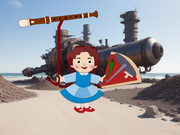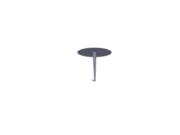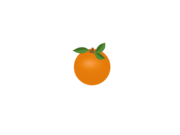可
can / may / able to / to approve / to permit / to suit / (particle used for emphasis) certainly / very
可
=
丁
+
口
:
Alternative mnemonic symbol: kebab, from the pronunciation "ke". Karl Marx (k) is preparing a kebab (mnemonic symbol for 可) in the elevator's living room (e3). He also skewers mandarins (口) on the long steel nails (丁) and will only allow (可) his guests to eat the rest of the kebab if they eat their mandarins first.
可 character breakdown
male adult / the 4th of the 10 Heavenly Stems 天干[tian1 gan1] / fourth (used like "4" or "D") / small cube of meat or vegetable / (literary) to encounter / (archaic) ancient Chinese compass point: 195° / (chemistry) butyl
丁
=
一
+
亅
:
Mnemonic symobl: a nail. 一 is the head of the nail and 亅 is the shaft. The point of the nail is already a bit bent.
Dorothy Gale (di) balances a flute (一) on a crowbar (亅) in front of the engine ((e)ng1). For this trick, she wins the fourth (丁) place in an artists competition and gets a quarter (丁) of a pizza as prize. Unfortunately, there is a big nail (mnemonic symbol for 丁) on the pizza slice.
Dorothy Gale (di) balances a flute (一) on a crowbar (亅) in front of the engine ((e)ng1). For this trick, she wins the fourth (丁) place in an artists competition and gets a quarter (丁) of a pizza as prize. Unfortunately, there is a big nail (mnemonic symbol for 丁) on the pizza slice.
Characters with 可 as component
river / CL:條|条[tiao2],道[dao4]
河
=
可
+
氵
:
A river has flooded the elevator, and in the kitchen, Hamlet is floating on a bed of nails. He found a water bottle to put upside down on the nails, so he has to balance on the bottle in order to not have to sit directly on the nails. It is quite difficult to do on a rocking makeshift raft.
strange / odd / weird / wonderful / surprisingly / unusually
奇
=
可
+
大
:
Mnemonic symbol: cappuccino (卡布奇诺)
The Queen of Hearts (qi) craves a cappuccino (奇) just inside the entrance of the space station (Ø2), and the robot (大) has one in his robot hands. He will give it to the Queen of Hearts under one weird (奇) condition: she shall prove that she's worth to receive the cappuccino by sitting on a bed of nails (可). The Queen agrees and pretends to be in much vain, but really she's just pretending since there is no gravity in the space station.
The Queen of Hearts (qi) craves a cappuccino (奇) just inside the entrance of the space station (Ø2), and the robot (大) has one in his robot hands. He will give it to the Queen of Hearts under one weird (奇) condition: she shall prove that she's worth to receive the cappuccino by sitting on a bed of nails (可). The Queen agrees and pretends to be in much vain, but really she's just pretending since there is no gravity in the space station.
prefix used before monosyllabic names, kinship terms etc to indicate familiarity / used in transliteration / also pr. [a4]
阿
=
可
+
阝
:
Auntie, Albert Einstein and the Pope are having a contest in front of the ashram: Who can sit longer on a bed of nails? The Pope secretly calls God's power and just hovers a little over the bed of nails. Albert Einstein calculates exactly how he has to place his body to not excert too much force on any body part. Auntie just sits down on the bed of nails, and wins in the end.
Words with 可
to succeed at the first try (idiom) / easy as pie / one can do it at once



